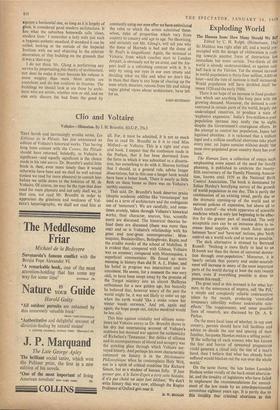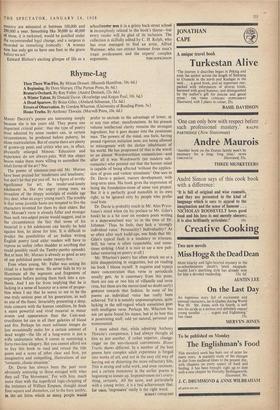Exploding World
The Human Sum: How Many Should We Be?
Edited by C. H. Rolph. (Heinemann, 18s.) So Malthus was right after all; and a world pre- occupied with the danger of obliteration is rush- ing towards another form of destruction less immediate but more certain. Two-thirds of the world is already undernourished, as against only half back in the Thirties. Yet the annual increase in world population is thirty-four million, 4,000 an hour—and the rate of increase is itself increasing. World population will have doubled itself be- tween 1920 and the early 1980s.
There is no hope of an increase in food produc- tion which can anything like keep pace with the growing demand. Moreover, the demand is con- centrated in certain parts of the world, largely the undeveloped countries, to produce a state of 'explosive expansion.' India's five-million-a-year population increase may easily rise to eight, despite the Government's courageous efforts. In the attempt to control her population, Japan has legalised abortion : it is reckoned that a million legal and a million unofficial abortions take place every year, yet Japan remains without doubt 'the most over-populated great country there has ever been.'
The Human Sum, a collection of essays each emphasising some aspect of the need for family planning, is published to celebrate the twenty- fifth anniversary of the Family Planning Associa- tion, known until 1939 as the National Birth Control Association. The book is dominated by Julian Huxley's horrifying survey of the growth of world population in our day. This is partly the continuation of an existing trend, partly due to the dramatic opening-up of the world and to national policies of expansion, but above all to 'death control'—the whole apparatus of scientific medicine which is only just beginning to be effec- tive for the greater part of mankind. The only acceptable cure can be an immense drive to in- crease food supplies, with much fairer shares between 'have' and 'have-not' nations, plus 'birth control on a world scale and as soon as possible.'
The dark alternative is stressed by Bertrand Russell : 'Nothing is more likely to lead to an H-bomb war than the threat of universal destitu- tion through over-population.' Moreover, it is 'nearly certain that poverty and under-nourish- ment will increase in many of the most important parts of the world during at least the next twenty years, even if everything possible is done to prevent this result.'
The great need at this moment is for what lay- men, to the annoyance of experts, call 'the Pill,' a simple and completely reliable contraceptive taken by the mouth, producing 'controlled temporary infertility without undesirable side- effects.' The requirements, and some possible lines of research, are discussed by Dr. A. S. Parkes.
On the more local issue of whether, in our own country, parents should have full facilities and advice to decide the size and spacing of their families, Jacquetta Hawkes makes a telling point : 'If the suffering of each woman who has known the fear and horror of unwanted pregnancies could generate a cloud only the size of a man's hand, then I believe that what has already been suffered would blacken out the sun over the whole world.'
On the same theme, the late James Lansdale Hodson writes vividly of the back-street abortion- ist, and the timidity of legislators who have failed to implement the recommendations for amend- ment of the law made by an interdepartmental committee eighteen years ago. It is partly due to Ibis timidity that criminal abortions in this
country are estimated at between 100,000 and 250,000 a year. Something like 30,000 to 40,000 of these, it is reckoned, would be justified under the recommended legal change, and a surgeon is recorded as remarking ironically : 'A woman now has only got to have one foot in the grave before we act.'
Edward Blishen's exciting glimpse of life as a schoolmaster sees it in a grimy back-street school is incompletely related to the book's theme—but every reader will .be glad of its inclusion. The collection is skilfully edited by C. H. Rolph, who has even managed to find an artist, Alfred Wurmser, who can extract humour from man's tragic predicament and the experts' complex



































 Previous page
Previous page